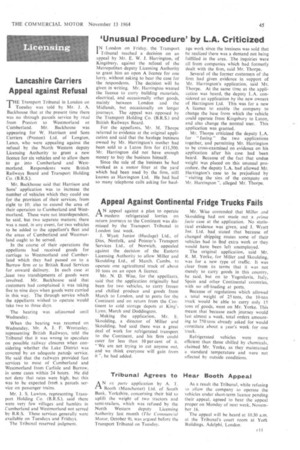'Unusual Procedure' by L.A. Criticized
Page 47

If you've noticed an error in this article please click here to report it so we can fix it.
IN London on Friday, the Transport I Tribunal reached a decision on an appeal by Mr. E. W. I. Harrington, of Kingsbury, against the refusal of the Metropolitan deputy Licensing Authority to grant him an open A licence for one lorry, without asking to hear the case for the respondents. The decision will be given in writing. Mr. Harrington wanted the licence to carry building materials, electrical, and occasionally other goods, mainly between London and the Midlands, hut occasionally on longer journeys. The appeal was opposed by the Transport Holding Co. (B.R.S.) and British Railways Board. For the appellants, Mr. M. Thorpe referred to evidence at the original application and said that the haulage business owned by Mr. Harrington's mother had been sold to a Luton firm for £11,500. Mr. Harrington did not have enough money to buy the business himself. Since the sale of the business he had worked as a motor fitter at the yard which had been used by the firm, still known as Harrington Ltd. He had had so many telephone calls asking for haul age work since the business was sold that he realized there was a demand not being fulfilled in the area. The inquiries were all from companies which had formerly dealt with the firm, said Mr. Thorpe. Several of the former customers of the firm had given evidence in support of Mr. Harrington's application, said Mr. Thorpe. At the same time as the application was heard, the deputy L.A. considered an application by the new owners of Harrington Ltd. This was for a new A licence to enable the company to change the base from which the vehicle could operate from Kingsbury to Luton, and also change the normal user. This application was granted. Mr. Thorpe criticized the deputy L.A. for " fusing " the two applications together, and permitting Mr. Harrington to be cross-examined on evidence on his application after his case had been heard. Because of the fact that undue weight was placed on this unusual procedure. the deputy L.A. had allowed Mr. Harrington's case to be prejudiced by " visiting the sins of the company on Mr. Harrington ", alleged Mr. Thorpe.
























































































































